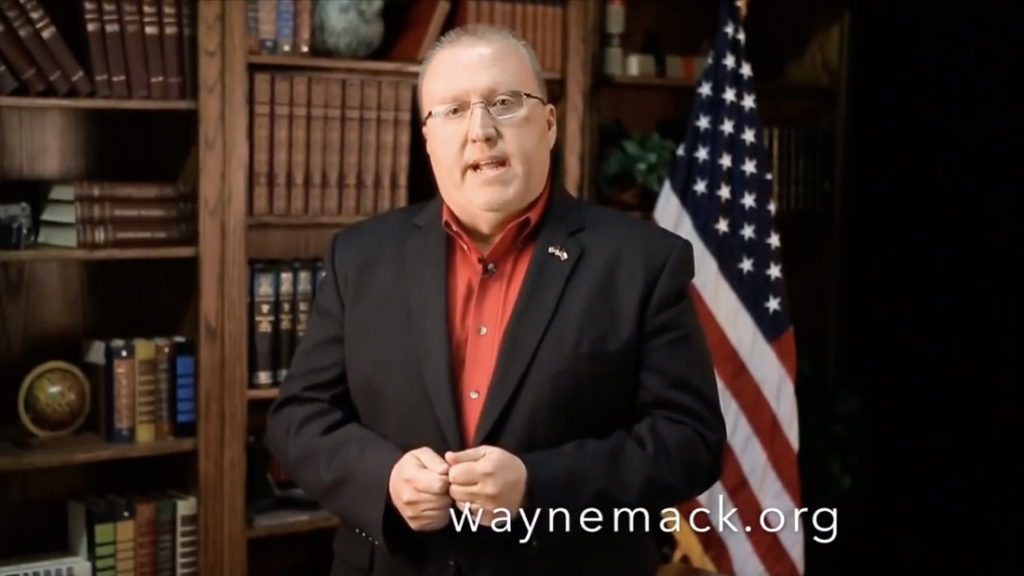After a multi-year battle, the Freedom From Religion Foundation has successfully won its case against a Texas judge who opened each session with prayer.
To make sense of this story, it helps to realize that the one thing a judge should never do is make one side feel like it’s not getting a fair shake in the courtroom. Both sides should expect a fair hearing and anything that detracts from that is a problem. Obviously.
And yet that was precisely what Montgomery County Justice of the Peace Wayne Mack was doing for years. In 2014, FFRF even wrote him a letter condemning his actions when he opened a court session with a five-minute Bible reading… followed by a formal prayer.

We understand that in August you opened one of your court sessions with the Christian prayer. We believe that this is regular practice in your courtroom. A concerned Montgomery County resident who had business before you contacted us to report that after you entered the courtroom you stated, “We are going to say a prayer. If any of you are offended by that you can leave into the hallway and your case will not be affected.” After that announcement, we understand that you introduced a pastor who read from the bible for more than five minutes. While the pastor was reading, our complainant says, “I felt that the Judge was watching for reactions from the courtroom; bowed heads, indifference, etc. I definitely felt that our cases would be affected by our reactions [to the bible reading].” Our complainant further says, “Once the Bible reading was over we were then asked to bow our heads to pray. I was very uncomfortable and certainly felt that I was being coerced into following this ritual and that the outcome of my case depended upon my body language.“
It was meaningless that Mack said “your case will not be affected” when all of his other actions indicated otherwise. Mack never responded to that letter, but a month later, promoting a prayer breakfast he was speaking at, he sent an email to supporters saying this:
… I will be addressing [FFRF’s] demand that we “immediately end the practice of court prayer” at the Oct 23rd Prayer Breakfast. I am not seeking the potential controversy, as I will have to respond to these groups as well. We are on strong moral and legal ground.
I want to make a statement to show those that feel what we are doing is unacceptable, that not only is it acceptable to our community, but show them that God has a place in all aspects of our lives and public service, during times of tragedy and conflict, when we as a community need to bring peace to the storm. That it is reflected in how we as a community respond and treat each other during these times of tragedy.
In short, Mack is a judge who doesn’t understand the First Amendment. He doesn’t get to ignore separation of church and state just because the majority of the community shares his faith. It’s the sort of thinking that ought to disqualify him as a judge — and probably would if we were talking about any religion other than Christianity.
The State Commission on Judicial Conduct was eventually tasked with investigating Mack… but they eventually did nothing. They just asked him to fall in line with the practices of other courtrooms without telling him explicitly to stop praying.
By 2015, Mack had changed his ways. Kind of.
After the introduction by the bailiff, Judge Mack enters the courtroom. While everyone remains standing, Judge Mack talks briefly about his chaplaincy program and introduces a religious leader from the program, who wears an official badge issued by Judge Mack.
After Judge Mack’s introduction, the chaplain leads a prayer, sometimes preceded by a short sermon. The prayers and sermons are directed to those in attendance in the courtroom and everyone present is asked to participate, or show obeisance, by bowing their heads.
…
… During the bailiff’s introduction, the chaplain-led prayer, and the courtroom business that follows, the courtroom doors remain magnetically locked. To exit, a person must push a button and reentry can only be granted by someone already inside the courtroom. Those seeking reentry after the prayers would need to draw attention to themselves by knocking on the courtroom doors.
So it wasn’t really any better than before. Even with the revision, non-Christians were still made to feel like outcasts in the courtroom.
That’s when FFRF decided to sue Mack on behalf of several clients who had appeared in front of him. That case was dismissed on a technicality, but FFRF filed another lawsuit correcting that issue; they went after Mack both as an individual and “in his official judicial capacity on behalf of the State of Texas.”
And now, two years after that lawsuit was filed, there’s a resolution. U.S. District Judge Kenneth M. Hoyt ruled that Mack was out of bounds by foisting his religion upon everyone.
The Court is of the view that the defendant [Mack] violates the Establishment Clause when, before a captured audience of litigants and their counsel, he presents himself as theopneustically-inspired, enabling him to advance, through the Chaplaincy Program, God’s “larger purpose.” Such a magnanimous goal flies in the face of historical tradition, and makes a mockery of both, religion and law. Accordingly, the plaintiffs are entitled to a summary judgment. Therefore, the Court declares that the defendant’s practice of opening regular court proceedings with religious prayers is unconstitutional… Should the defendant violate this Court’s declaratory decree, an injunction will issue.
In plain English, that means Mack must stop turning his courtroom into a church. And if he refuses to do so, the consequences will be much more severe.
FFRF celebrated the decision:
“In a time where the wall of separation between state and church is continually chipped away, this decision is welcomed for its straightforward and accurate interpretation of the Establishment Clause, noting the prayer practice ‘flies in the face’ of our traditions,” comments FFRF Legal Director Rebecca Markert.
As always, it shouldn’t take a lawsuit for a judge to follow the damn law. But if that’s what it takes, so be it. Mack can be a pastor. He can be a judge. He cannot be both at the same time. He can whine about this ruling all he wants, but nothing about the decision should come as a surprise to him.
(Screenshot via YouTube. Large portions of this article were published earlier)




It’s Moving Day for the Friendly ..."
It’s Moving Day for the Friendly ..."
It’s Moving Day for the Friendly ..."
It’s Moving Day for the Friendly ..."